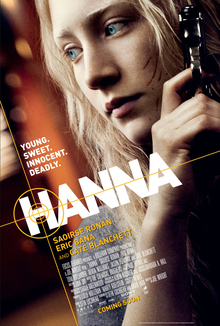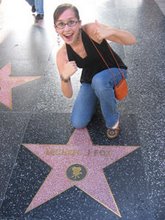This post also appears online at MediaBlvd Magazine.
This weekend I finally saw Joe Wright's thriller Hanna, starring Saoirse Ronan in the title role, and reuniting her with her director from Atonement. Hanna is a girl raised deep in the forest by her father Erik Heller (Eric Bana), who has trained her to be an intelligent, skilled, fighter and survivalist. He has raised her with the knowledge that they have one true enemy, Marissa Wiegler (Cate Blanchett), who killed her mother and who will stop at nothing to end Hanna's life. At sixteen, Hanna has learned all that Erik can teach her, and is ready to go out into civilization. She wants to hear music, see the world, and make a friend. With this, she knows the battle with Wiegler will come.
Whether or not Erik has been telling Hanna the truth her whole life is very slowly revealed over the course of the film, as is the reasoning behind why Marissa Wiegler could be viewed as a threat. I didn't know whether to be impressed by Hanna or feel bad for her, or whether she was actually fighting for a good cause or not. Wright, cinematographer Alwin Kuchler, and editor Paul Tothill do a good job of contributing to the cloaked mysteries by obscuring the high-energy action scenes with usage of handheld camera, optical illusion editing, and some mind-bending camera angles. In particular, the scene where Hanna is being held in a CIA compound takes on a surreal vibe, when 360-degree camera tracking combines with a motif of circular cameras, tunnels, and windows.
This unsettling feeling of never quite knowing what's what is accompanied by The Chemical Brothers' frenetic score. I don't know whether it was the music, the augmented reality, or the hyperactive storytelling flourishes, but I got a very 1990s vibe throughout the film. Unlike Wright's Atonement and Pride and Prejudice (both adaptations), Hanna displays more of his background in music videos, feeling at home alongside films by David Fincher, Danny Boyle, Baz Luhrmann, or Michel Gondry. Scenes when Hanna struggles to understand the sensory overload of unfamiliar technology in a Moroccan hotel room, or when she later visits a demented storybook house complete with cartoon statuary, contribute to the otherworldliness of the story. Sometimes it feels a bit over-the-top, such as when Wiegler visits an associate at a German sex club, and the dialogue is written to provoke without contributing in any way to the plot or characters. Wright does keep his signature tracking shots in top form, but they don't beat the one from Atonement.
Bana's performance is merely fine, but he doesn't really have that much to do, compared to Ronan and Blanchett. The young star's performance is physically demanding, and she does a good job punctuating her warrior coldness with a love of learning and a genuine fondness for the new friend she makes in English tourist Sophie (Jessica Barden). Barden was a pleasant surprise, turning what at first seems like a caricature of an annoying teenage brat into a surprisingly multifaceted girl longing to be interesting. Blanchett plays a villain straight from the pages of a comic strip, with her severe hairstyle, heavy Southern accent, and fixation on dental hygiene. Olivia Williams and Jason Flemyng contribute enjoyable performances as Sophie's hippie parents.
I considered Hanna to be an art film from its first, atypical hunting sequence, which helped me to overlook flawed story elements that would have been more bothersome if the form of the movie weren't so compelling. We are, eventually, given just enough backstory to tie up most of the loose ends the story introduces, and the action satisfies enough that the "Why?" is unimportant. That said, it is never explained how Heller manages to swim across the Baltic Sea in wintertime in a pair of capri pants, but that is a point of contention best left for my dad and I to joke about, as it doesn't really have any bearing on the story.
Tuesday, May 3, 2011
Subscribe to:
Post Comments (Atom)





1 comment:
Good observations of an interesting movie!
Post a Comment